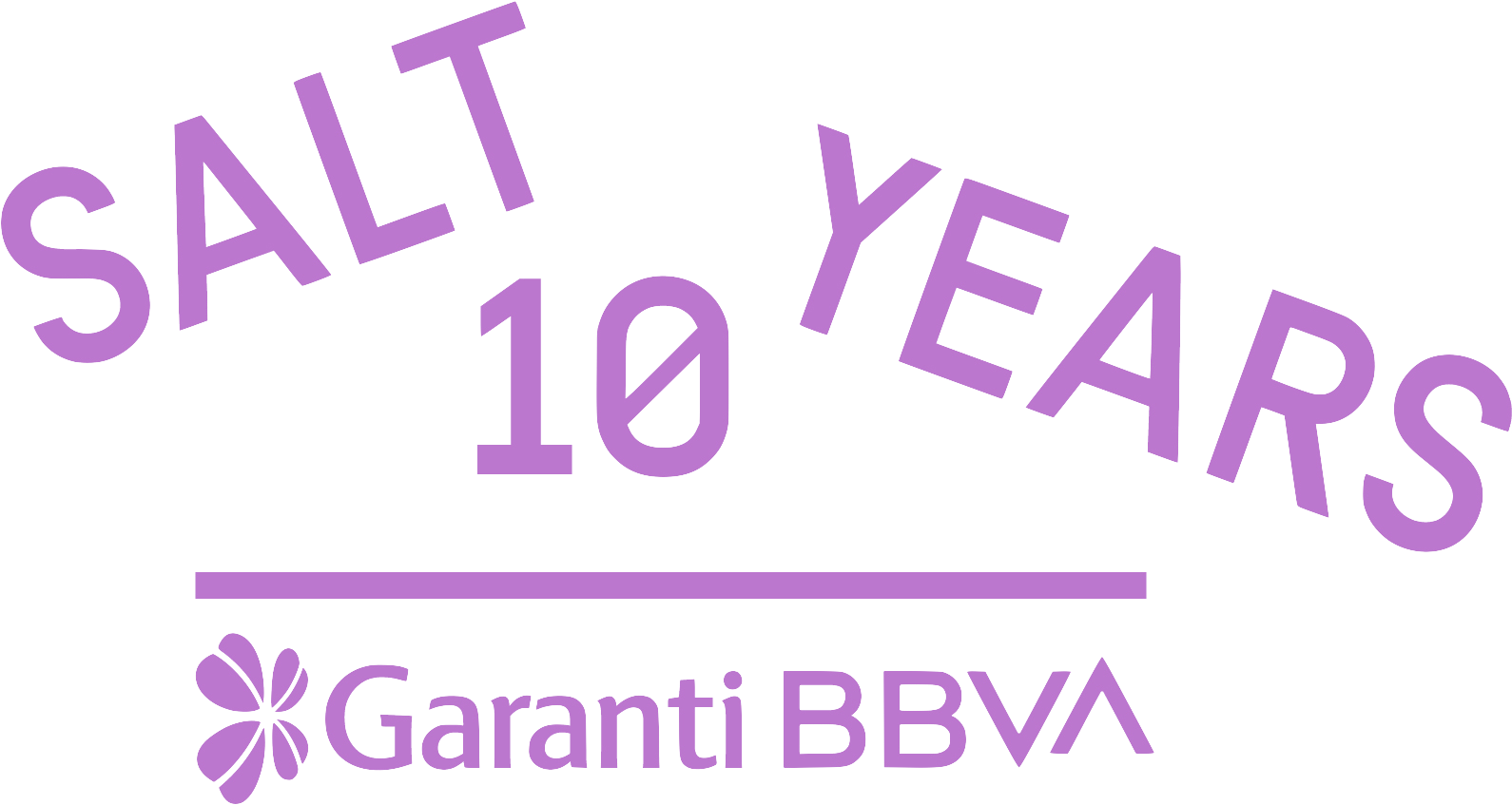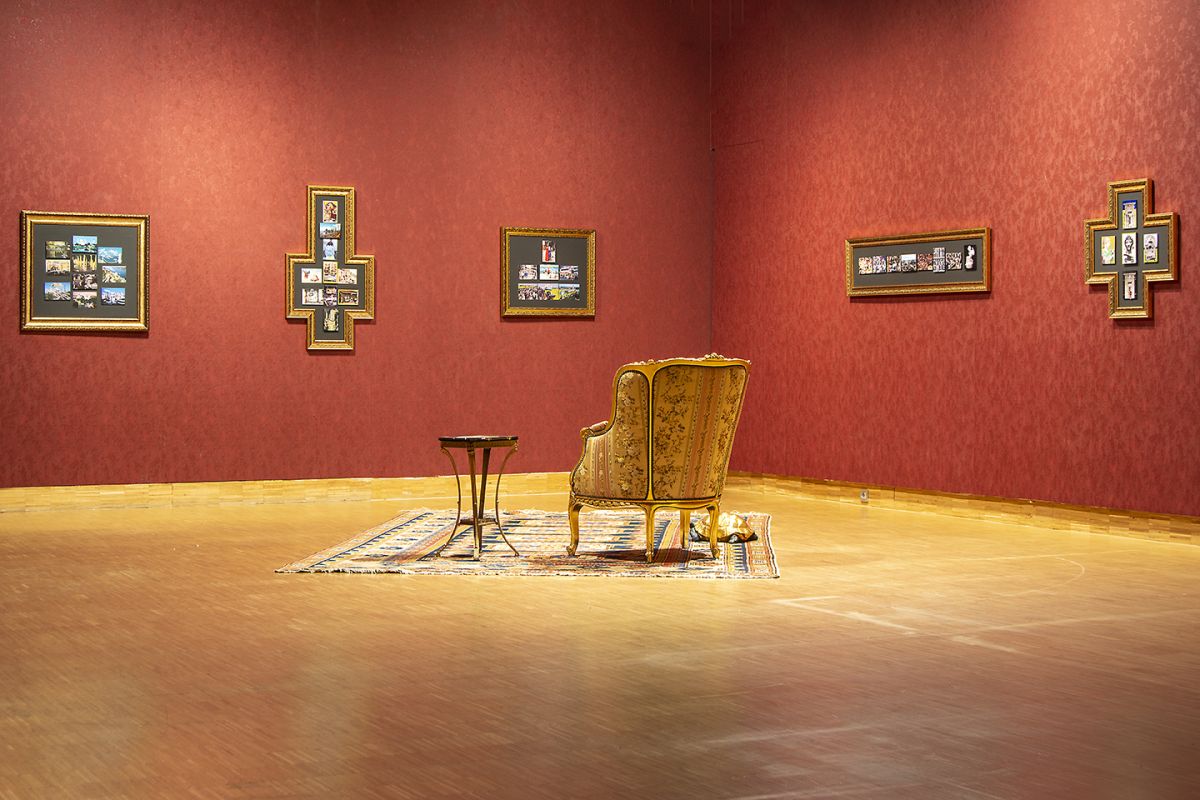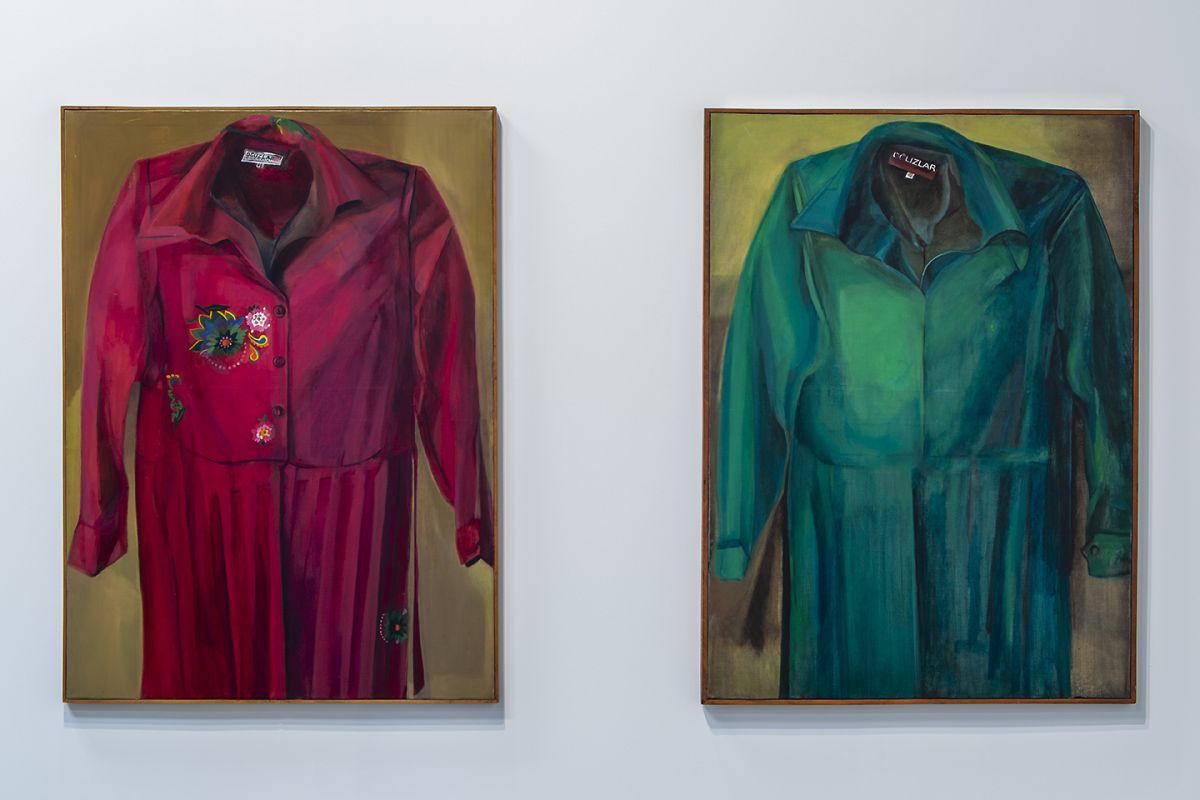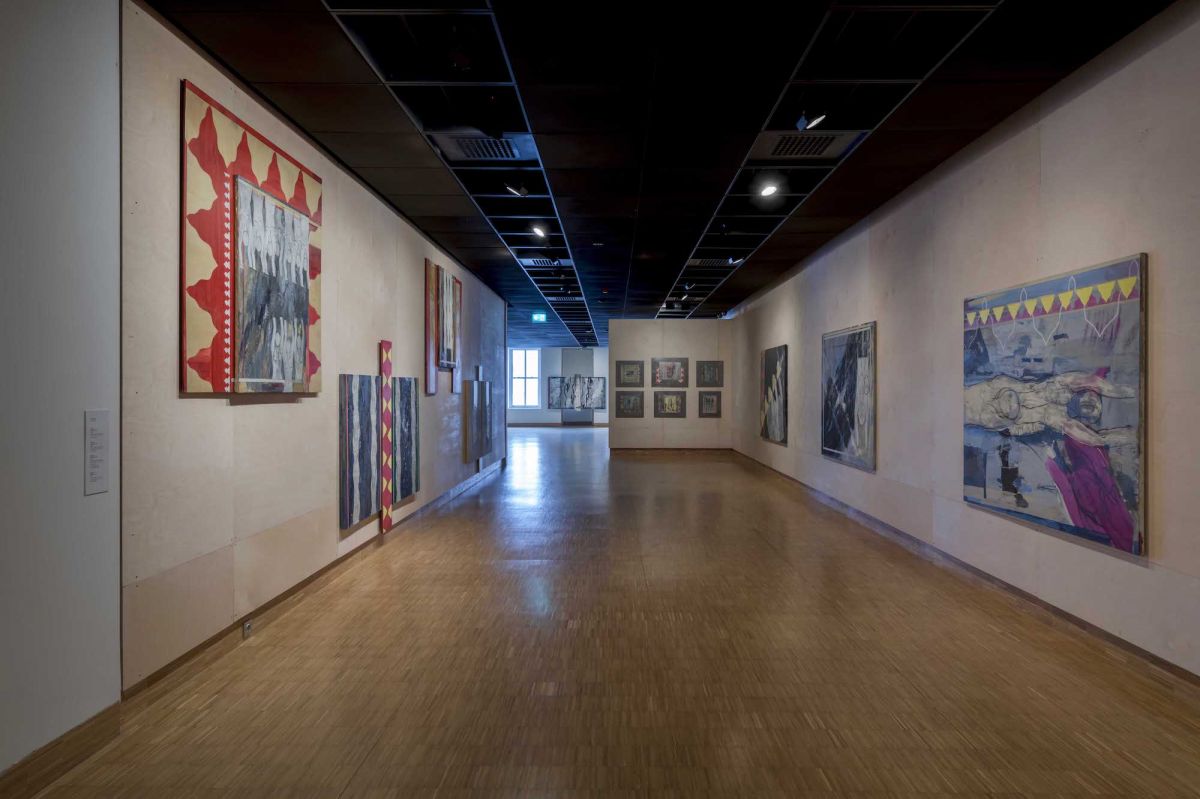THE SKIN, BODY, AND I İpek Duben
Salt Beyoğlu
December 9, 2021 – May 8, 2022
The most comprehensive exhibition of İpek Duben’s work to date, spanning over forty years of her practice, is presented at SALT Beyoğlu. Referring to the artist’s extensive use of her body image, The Skin, Body, and I offers insight into her works, exploring gender, male violence, displacement, migration, and excessive consumption. The exhibition reevaluates Duben’s entire oeuvre, from drawings and paintings made in the early 1980s to her most recent series Angels and Clowns in 2020.
Comprising a single drawing and eleven paintings, Şerife (1980-1982) is the first body of work in which Duben tackled issues such as migration, perception of the “other,” and gender within a local context. For the headless and bodiless portraits of Şerife, who went to her sister’s house to clean, the artist filled up a dress she had purchased from the street market to replace the live model. Creating a representational model of her subject, and drawing attention to women whose presence and labor are deemed invisible, the paintings assume a feminist stance. They also convey the shift between cultural traditions and customs as well as urban and rural lives. Based on a newspaper clipping, the triptych Adale Adam [The Muscle Man] (1988) includes a male figure proud of his muscles, unapologetically displaying his naked torso. In contrast to Şerife’s modest demeanor, these anonymous men covering the surface of the paintings with their upright bodies appear intimidating. Presented side by side in the exhibition, the two series highlight the inequality between gender-based body representations.
In 1984, Duben had the opportunity to examine miniatures from a broad geography, from Mongolia to Iran, at London’s Victoria and Albert Museum. The artist’s observations of the painted surfaces, depiction of the figures, spatial structures, and compositions, deeply affected her practice. Duben’s desire to combine the energy and movement particular to expressionism with the inertia of the miniature, also reflected the artist’s existential dilemmas in her journey from Istanbul, where she was born and raised, to Chicago for her studies. She started investigating her position as a woman within the context of the East-West dichotomy through the painting series Traces (1990-2021) and Register (1991-1992). This issue became one of the main threads of her works, as in Manuscript 1994 (1993-1994), where she gravitated toward installation and artist books in line with her conceptual pursuits. Her investigation continued first through Manuscript X (2010-2012) and more recently with Suspended (2012-2018).
The period she spent in New York during the 1990s was the start of a new, liberating era for Duben in which she combined her subject matter with different forms and materials. At the beginning of the 2000s, the artist focused on male violence and stories of forced migration. The installations LoveBook (1998-2000), compiling news reports on domestic violence from the Turkish and US media, and LoveGame (1998-2001), based on the same scrutiny, showed Duben’s increasing desire to make an immersive environment. While the artist approached the “other” through the lens of national identity in What is a Turk? (2003), she shifted her focus to displaced individuals—regardless of religion, language, ethnic origin—with Farewell My Homeland (2004). Built from Duben’s observations of the social, cultural, and economic transformations in the last two decades, Angels and Clowns dealt with the contradictions of the new world that normalizes extremist consumption while overlooking the devastating losses experienced by a particular segment of society.
The Skin, Body, and I is programmed by Vasıf Kortun together with Amira Akbıyıkoğlu, Farah Aksoy, and Sezin Romi from SALT. Further information on the parallel public programs will be announced at saltonline.org and SALT Online’s social media channels.
Thanks to Anıt Sayaç [The Monument Counter] for its contribution to the exhibition.
Program: Amira Akbıyıkoğlu (SALT), Farah Aksoy (SALT), Sezin Romi (SALT), Vasıf Kortun
Editor: Ezgi Arıduru
Translation: Ezgi Yurteri, Gülşah Mursaloğlu
Exhibition Design and Production: Emirhan Altuner (SALT)
Graphic Design: Ecem Ergin
Communication Design: Informal Project
SALT’s founder and supporter, Garanti BBVA contributes to social change by raising awareness of gender equality.

Comprising a single drawing and eleven paintings, Şerife (1980-1982) is the first body of work in which Duben tackled issues such as migration, perception of the “other,” and gender within a local context. For the headless and bodiless portraits of Şerife, who went to her sister’s house to clean, the artist filled up a dress she had purchased from the street market to replace the live model. Creating a representational model of her subject, and drawing attention to women whose presence and labor are deemed invisible, the paintings assume a feminist stance. They also convey the shift between cultural traditions and customs as well as urban and rural lives. Based on a newspaper clipping, the triptych Adale Adam [The Muscle Man] (1988) includes a male figure proud of his muscles, unapologetically displaying his naked torso. In contrast to Şerife’s modest demeanor, these anonymous men covering the surface of the paintings with their upright bodies appear intimidating. Presented side by side in the exhibition, the two series highlight the inequality between gender-based body representations.
In 1984, Duben had the opportunity to examine miniatures from a broad geography, from Mongolia to Iran, at London’s Victoria and Albert Museum. The artist’s observations of the painted surfaces, depiction of the figures, spatial structures, and compositions, deeply affected her practice. Duben’s desire to combine the energy and movement particular to expressionism with the inertia of the miniature, also reflected the artist’s existential dilemmas in her journey from Istanbul, where she was born and raised, to Chicago for her studies. She started investigating her position as a woman within the context of the East-West dichotomy through the painting series Traces (1990-2021) and Register (1991-1992). This issue became one of the main threads of her works, as in Manuscript 1994 (1993-1994), where she gravitated toward installation and artist books in line with her conceptual pursuits. Her investigation continued first through Manuscript X (2010-2012) and more recently with Suspended (2012-2018).
The period she spent in New York during the 1990s was the start of a new, liberating era for Duben in which she combined her subject matter with different forms and materials. At the beginning of the 2000s, the artist focused on male violence and stories of forced migration. The installations LoveBook (1998-2000), compiling news reports on domestic violence from the Turkish and US media, and LoveGame (1998-2001), based on the same scrutiny, showed Duben’s increasing desire to make an immersive environment. While the artist approached the “other” through the lens of national identity in What is a Turk? (2003), she shifted her focus to displaced individuals—regardless of religion, language, ethnic origin—with Farewell My Homeland (2004). Built from Duben’s observations of the social, cultural, and economic transformations in the last two decades, Angels and Clowns dealt with the contradictions of the new world that normalizes extremist consumption while overlooking the devastating losses experienced by a particular segment of society.
The Skin, Body, and I is programmed by Vasıf Kortun together with Amira Akbıyıkoğlu, Farah Aksoy, and Sezin Romi from SALT. Further information on the parallel public programs will be announced at saltonline.org and SALT Online’s social media channels.
Thanks to Anıt Sayaç [The Monument Counter] for its contribution to the exhibition.
Program: Amira Akbıyıkoğlu (SALT), Farah Aksoy (SALT), Sezin Romi (SALT), Vasıf Kortun
Editor: Ezgi Arıduru
Translation: Ezgi Yurteri, Gülşah Mursaloğlu
Exhibition Design and Production: Emirhan Altuner (SALT)
Graphic Design: Ecem Ergin
Communication Design: Informal Project
SALT’s founder and supporter, Garanti BBVA contributes to social change by raising awareness of gender equality.



![01 Tenbedenben 08122021 014 1 İpek Duben, <i>Manuscript 1994</i> [El Yazması 1994] (1993-1994)
<i>Ten, Beden, Ben</i>, SALT Beyoğlu
Fotoğraf: Mustafa Hazneci (SALT)](/directus/media/thumbnails/01-tenbedenben_08122021_014-1-jpg-1200-1200-false.jpg)
![03 Dsc8916 İpek Duben, <i>Suspended 1</i> [Muallak 1] (2012), <i>Suspended 10</i> [Muallak 10] (1992-2012), <i>Suspended 9</i> [Muallak 9] (2012)
<i>Ten, Beden, Ben</i>, SALT Beyoğlu
Fotoğraf: Mustafa Hazneci (SALT)](/directus/media/thumbnails/03_dsc8916-jpg-1200-1200-false.jpg)

![06 Dsc9038 İpek Duben, <i>Farewell My Homeland</i> [Elveda Yurdum] (2004)
<i>Ten, Beden, Ben</i>, SALT Beyoğlu
Fotoğraf: Kayhan Kaygusuz](/directus/media/thumbnails/06_dsc9038-jpg-1200-1200-false.jpg)
![07 Dsc8746 İpek Duben, <i>LoveGame</i> [Aşk Oyunu] (1998-2001)
Banu ve Hakan Çarmıklı Koleksiyonu izniyle
<i>Ten, Beden, Ben</i>, SALT Beyoğlu
Fotoğraf: Kayhan Kaygusuz](/directus/media/thumbnails/07_dsc8746-jpg-1200-1200-false.jpg)

